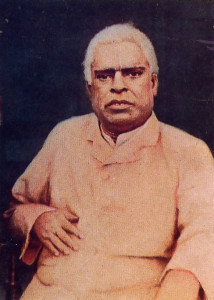by Srila Bhaktivinoda Thakura
(translated from the Bengali by Jayasacinandana dasa).
O Lord, there is nothing that I call “mine.” You alone are my father, friend, and brother.
My friends, wife, sons, and daughters are actually Your servants and maidservants. So whatever care I take for them is only to please You.
If I go on maintaining my wealth, family members, home, and wife, I do it simply because they are Yours. As for myself, I am just Your servant.
To serve You I will earn money and bear the expenditures of Your household.
I don’t care about what may be good or bad for me. I just care about serving You. I am only a watchman who guards the properties in Your household.
Whenever I use my senses—to hear, to see, to smell or taste—I do it just to please You.
I no longer do anything for my own pleasure. Thakura Bhaktivinoda says, “Your happiness is the essence of everything.”
 THIS IS A SONG written at the end of the nineteenth century by Srila Bhaktivinoda Thakura, a great spiritual master in the disciplic line of Krsna consciousness. It is an excerpt from a larger work entitled Saranagati (Taking Shelter).
THIS IS A SONG written at the end of the nineteenth century by Srila Bhaktivinoda Thakura, a great spiritual master in the disciplic line of Krsna consciousness. It is an excerpt from a larger work entitled Saranagati (Taking Shelter).
Srila Bhaktivinoda Thakura was a householder, with a wife and children, and he was a responsible government magistrate. Yet despite his apparent involvement in affairs of this material world, he was perfectly Krsna conscious, with his mind, words, and actions fully dedicated to the service of Lord Sri Krsna. According to the teachings of Sri Caitanya Mahaprabhu, the original teacher of Krsna consciousness in the modern age, one need not change one’s position in this material world, but only one’s consciousness. This is confirmed throughout the Vedic literature. There is no need to give up one’s home, job, or family; one need only change one’s consciousness from material consciousness to Krsna consciousness, and one’s life will become sublime. One who knows the science of Krsna and is fully absorbed in Krsna consciousness is a liberated soul, even in this material world, and is fully qualified to be a spiritual master.
In this song, Srila Bhaktivinoda Thakura expresses the ideal of family life in Krsna consciousness. A Krsna conscious person knows that he is not the body but a spiritual soul within the body, and he knows that he is an eternal servant of Krsna, the Supreme Personality of Godhead. Therefore, he sees life not in terms of temporary bodily relationships but in the light of the eternal relationship with Krsna. He knows that Krsna alone is the true proprietor and enjoyer of everything and that Krsna is everyone’s most intimate relative and well-wishing friend.
Although friendships and family life within this material world are temporary, one’s friends and relatives, in their true, eternal identity, are all servants of Krsna, even if now they may not know it. The Krsna conscious person, therefore, is always thinking of how to engage his friends and relatives—and, for that matter, all living beings—in the service of Krsna. The key to this transcendental consciousness is the chanting of the holy names of the Lord—Hare Krsna, Hare Krsna, Krsna Krsna, Hare Hare/ Hare Rama, Hare Rama, Rama Rama, Hare Hare.
A householder is duty-bound to support his family and provide for their material needs, and he is equally obliged to see to their spiritual well-being. It is said that one should not become a mother, a father, a husband, or a teacher unless one can protect those under his care from the clutches of death by engaging them in the devotional service of Krsna. To do this a responsible person will see that everyone under his care takes part in a regular program of chanting Hare Krsna, studying revealed scriptures like Bhagavad-gita and Srimad-Bhagavatam, and eating only krsna-prasada (vegetarian food offered to Lord Krsna with devotion).
Although attachment to home, wife, children, friends, and money is an impediment to spiritual advancement, a Krsna conscious person knows that the family, friends, and possessions he calls “his” in fact belong to Krsna alone. Therefore, he continues to carry out his worldly duties, but only for the satisfaction of Krsna. Whereas a materialist works in worldly life to please himself or his friends and relatives, a Krsna conscious person works in the same way, but only to please Krsna, the Supreme Lord. Therefore he is a perfect transcendentalist. Although acting in worldly affairs, he is never affected by material entanglements. In this way, he resembles a lotus, which always rests upon the water but never becomes wet. By dedicating one’s mind, one’s body, one’s home-whatever one has—to the service of the Lord, one remains perfectly situated in transcendental life.
by Jayadvaita Svami

Leave a Reply